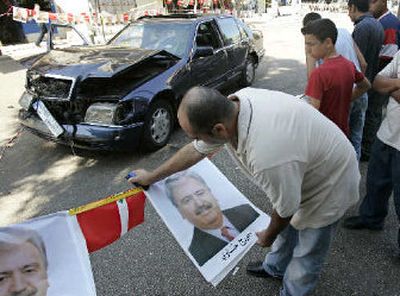Lebanese critic of Syria killed in blast

BEIRUT, Lebanon – Lebanon was just starting to settle down after a bitterly fought election that the anti-Syrian opposition won.
George Hawi, a former communist leader and a critic of Syria, got into his chauffeur-driven car and headed down the street – apparently to a nearby cafe.
A bomb made of less than two pounds of plastic explosive placed under his seat exploded, and the vehicle slowly zigzagged to a stop in the middle of the road Tuesday morning.
His driver, slightly injured, rushed to his boss’ side of the Mercedes. A worker from a nearby car dealership rushed up and the two men tried to lift Hawi out of the car. “Help me, help me,” the bleeding Hawi said. Then he died.
His wife, Sossie, an ophthalmologist, rushed from her nearby clinic. The bomb had blasted her husband’s abdomen. She collapsed in tears.
It was another assassination in Beirut, the Lebanese capital where people speak of a “hit list” against anti-Syrian politicians.
The burly, 67-year-old Hawi had been a fixture of Lebanon for the past three decades. A voice of militant communism in the early days of the 1975-90 civil war, a strong ally of Syria and a leader of anti-Israeli guerrillas during the 1980s, the white-haired Hawi was to transform himself into an advocate of Christian-Muslim dialogue and an outspoken critic of Syrian domination.
In Lebanon, opposition figures quickly blamed Syrian agents and their allies in the Lebanese security services for the assassination as they did for the June 2 slaying of anti-Syrian journalist Samir Kassir and the Feb. 14 killing of former Prime Minister Rafik Hariri.
The Bush administration stopped just short of blaming Syria.
“These are not random killings. These are targeted assassinations of political figures,” White House spokesman Scott McClellan said. “Syria’s long and continued presence inside Lebanon has created an environment of intimidation and political repression.”
In Brussels, Belgium, Secretary of State Condoleezza Rice said: “I do not know who was responsible for this and I don’t want to say that I know who was responsible, because I don’t. But there is a context and an atmosphere of instability. Syria’s activities are a part of that context and that atmosphere and they need to knock it off.”
And Rice said there is “uncertainty about Syrian activities in Lebanon,” despite Syrian claims that it pulled the last of its troops and intelligence forces out of the country in April.
More than 1,000 Hawi supporters gathered at the bomb site on Tuesday night, holding candles and white sheets of paper with the words: “Syria: who’s next?”